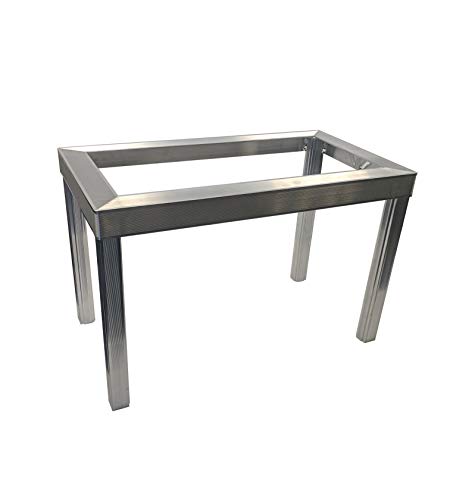When it comes to selecting the right horizontal ground loop heat pump for your home in 2025, you’ll want to reflect on several key factors. Size, weight capacity, and material durability all play essential roles in ensuring ideal performance. Plus, installation ease and compatibility with your existing systems can make or break your experience. Let’s explore these elements to help you find the perfect fit for your heating needs. You might be surprised by what you discover next.
Aluminum Heat Pump Ground Stand for Mini Split
If you’re looking for a sturdy and reliable base for your mini split heat pump, the Aluminum Heat Pump Ground Stand by Spacevent is your go-to choice. Its durable aluminum structure provides excellent support, holding up to 300 pounds with ease. Measuring 14.25 x 26 inches and weighing only 5.9 pounds, it’s lightweight yet robust. You won’t have to worry about assembly, as it comes ready to use with fixed legs for stability. Plus, if you find a lower price elsewhere, Spacevent offers a feedback option to report it. This stand guarantees your heat pump operates efficiently and securely.
Best For: Homeowners or HVAC professionals seeking a lightweight and durable stand for mini split heat pumps.
Pros:
- Lightweight design makes it easy to transport and install.
- No assembly required, allowing for quick and hassle-free setup.
- High weight capacity of 300 lbs ensures stability for various mini split models.
Cons:
- Fixed legs may limit versatility in uneven terrain.
- Aluminum construction may be less durable than other materials in extreme weather conditions.
- Limited warranty information may raise concerns for long-term use.
Factors to Consider When Choosing Horizontal Ground Loop Heat Pumps
When choosing a horizontal ground loop heat pump, you’ll want to contemplate several key factors that can impact performance. Think about the size and space requirements, weight capacity, and how easy the installation will be for your situation. Also, guarantee the materials are durable and compatible with your existing heating system for peak efficiency.
Size and Space Requirements
Choosing the right size and space for your horizontal ground loop heat pump is essential to guarantee peak performance and efficiency. You’ll need at least 1,000 to 2,000 square feet for ideal installation, considering your available land. The type of soil plays a significant role, as sandy or loose soil enhances heat transfer, while clay or rocky ground may hinder efficiency. Make sure your horizontal loops, typically 4 to 6 feet deep, have enough space to avoid overlap. Additionally, factor in extra room for maintenance access during your site planning. Finally, be aware of local regulations regarding distances between loop fields and property lines, as these can impact both size and layout of your installation.
Weight Capacity Considerations
Understanding the weight capacity of your horizontal ground loop heat pump is essential for ensuring a safe and efficient installation. When choosing a unit, remember that it needs to support not just its own weight, but also any additional equipment or insulation. Most horizontal ground loop heat pumps can handle between 200 to 500 pounds, but this varies by model. Exceeding this capacity can lead to structural failure and reduced efficiency. Make sure your ground loop design incorporates adequate support structures that evenly distribute weight across the installation area. To avoid issues, always consult manufacturer specifications to confirm that your chosen heat pump’s weight aligns with your support system’s capacity. Prioritizing this consideration will enhance your system’s longevity and performance.
Installation and Setup Ease
A well-planned installation can greatly enhance the performance of your horizontal ground loop heat pump, just as understanding its weight capacity does. When choosing a unit, consider how easy it is to install. Many models require minimal tools and can often be set up without professional help. Look for designs that provide straightforward access to connections and components, which can speed up the installation process. Clear, detailed manuals are a must—they’ll help you reduce setup time and avoid mistakes. Additionally, opting for a lightweight model or one with fixed legs can simplify positioning and alignment. Finally, check if specialized equipment is necessary for installation, as this could impact both ease and cost.
Material Durability Factors
When selecting a horizontal ground loop heat pump, the materials used play a crucial role in its overall durability and performance. You’ll want materials that can withstand soil conditions, temperature fluctuations, and moisture over time. Common options like galvanized steel, stainless steel, and high-density polyethylene each offer varying corrosion resistance and structural integrity. Don’t overlook the insulation materials, as their durability affects the system’s longevity and efficiency. Properly chosen materials can minimize maintenance costs and extend operational lifespan. Additionally, make certain to test for UV resistance and chemical compatibility for components exposed to the elements—this guarantees they can endure harsh conditions without compromising performance. Your heat pump’s durability directly impacts your investment, so choose wisely.
Heat Pump Compatibility
Selecting the right horizontal ground loop heat pump means making sure it aligns with your property’s specific heating and cooling needs. Start by evaluating your heating and cooling load requirements to guarantee peak performance. Next, check the refrigerant type; compatibility here impacts both efficiency and environmental impact. Confirm the heat pump’s dimensions and weight fit your installation site, especially if a ground stand is necessary. Examine energy efficiency ratings, as higher ratings not only save you money but also support your energy-saving goals. Finally, consider installation requirements, including the space for the horizontal ground loop and any local regulations that could affect compatibility. Taking these factors into account will help you choose the best heat pump for your needs.
